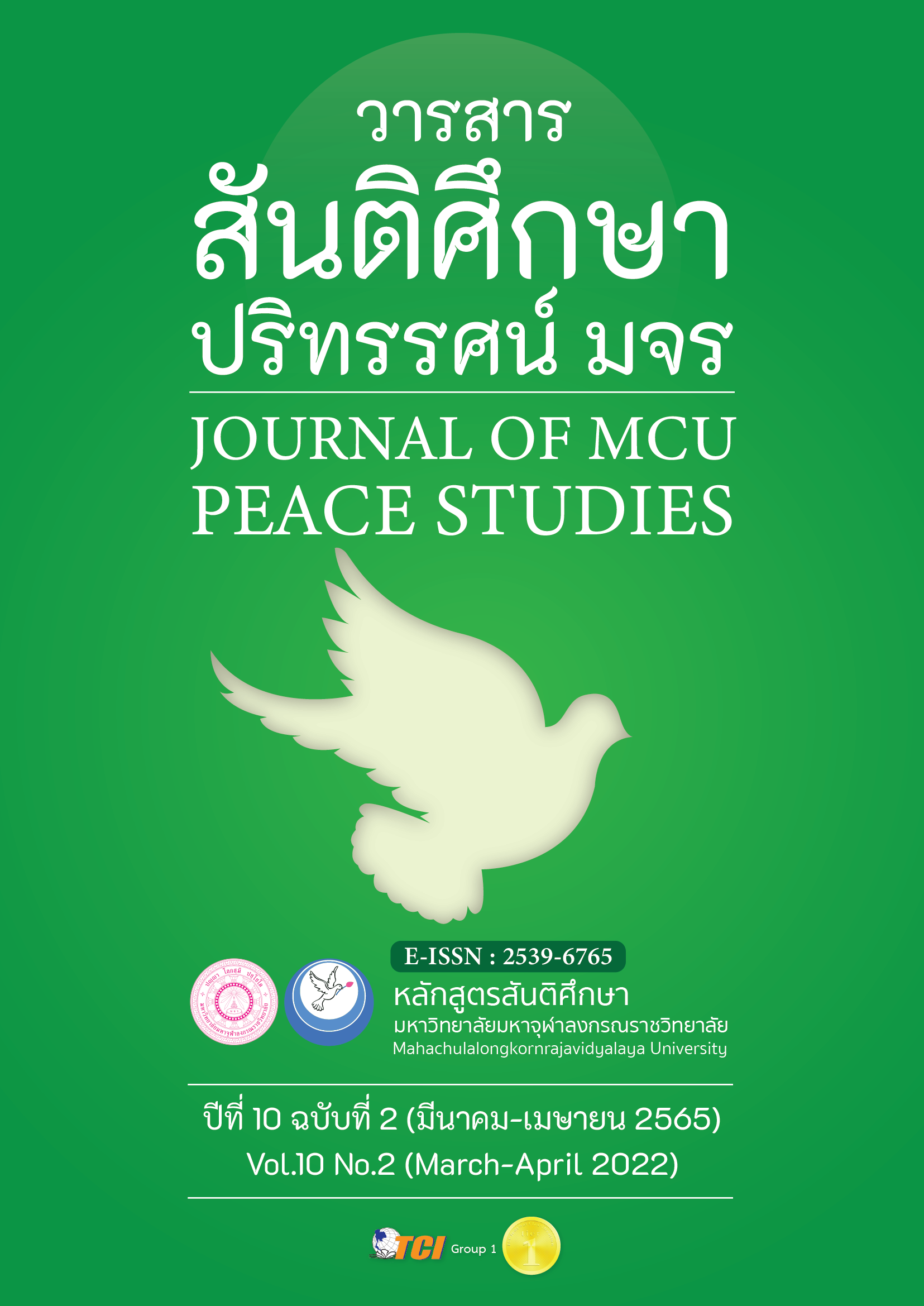การพัฒนารูปแบบการสอนดนตรี เพื่อส่งเสริมทักษะการคิดเชิงบริหาร สำหรับนักเรียนชั้นมัธยมศึกษาปีที่ 3
Main Article Content
บทคัดย่อ
บทความวิจัยนี้ มีวัตถุประสงค์เพื่อพัฒนารูปแบบการสอนดนตรีเพื่อส่งเสริมทักษะการคิดเชิงบริหาร และศึกษาผลการใช้รูปแบบการสอน การวิจัยดำเนินการตามกระบวนการวิจัยและพัฒนา ระยะที่ 1 การพัฒนาร่างรูปแบบการเรียนการสอน จากการศึกษาเอกสารที่เกี่ยวข้อง ระยะที่ 2 การหาความตรงของรูปแบบ ประกอบด้วย 2 ขั้นตอน คือ 1) การหาความตรงภายในโดยผู้เชี่ยวชาญด้วยการสัมภาษณ์กลุ่ม เครื่องมือที่ใช้คือ แบบสัมภาษณ์กลุ่มและแบบประเมิน วิเคราะห์ข้อมูลเชิงเนื้อหา หาค่าเฉลี่ย ร้อยละ 2) การหาความตรงภายนอกโดยการนำรูปแบบไปใช้ด้วยการวิจัยเชิงปฏิบัติการเพื่อพิจารณาความเป็นไปได้ของรูปแบบกับนักเรียนชั้นมัธยมศึกษาปีที่ 3 โรงเรียนพิมายวิทยา จังหวัดนครราชสีมา ในภาคเรียนที่ 2 ปีการศึกษา 2562 จำนวน 30 คน และครูผู้สอนดนตรีจำนวน 5 คน เครื่องมือที่ใช้คือ รูปแบบการเรียนการสอนดนตรี และแบบทดสอบทักษะการคิดเชิงบริหาร วิเคราะห์ข้อมูลโดยหาค่าเฉลี่ย ร้อยละ แสดงคะแนนแบบทดสอบก่อนเรียนและคะแนนแบบทดสอบหลังเรียนเทียบกับเกณฑ์ที่กำหนด
ผลการวิจัยพบว่า 1) รูปแบบการเรียนการสอนที่พัฒนาขึ้นมี 8 ขั้นตอน ได้แก่ (1) กระตุ้นความสนใจ (2) เชื่อมโยงความรู้ (3) ปรับโครงสร้างความรู้ (4) ยืนหยัดความรู้ (5) ขยายความรู้ (6) จัดการองค์ความรู้ (7) บูรณาการความรู้ และ (8) ตรวจสอบความรู้ความเข้าใจ ผลการตรวจสอบคุณภาพภายใน พบว่า รูปแบบการเรียนการสอนอยู่ในระดับคุณภาพ ดี ผลการตรวจสอบคุณภาพภายนอกด้วยการวิจัยเชิงปฏิบัติการพบว่า รูปแบบการเรียนการสอนที่พัฒนาขึ้นสามารถทำให้เกิดการเรียนรู้ได้ตามวัตถุประสงค์ของรูปแบบ และ 2) นักเรียนมีทักษะการคิดเชิงบริหารหลังเรียนสูงกว่าก่อนเรียนอย่างมีนัยสำคัญทางสถิติที่ระดับ .01
Article Details

อนุญาตภายใต้เงื่อนไข Creative Commons Attribution-NonCommercial-NoDerivatives 4.0 International License.
ทัศนะและความคิดเห็นที่ปรากฏในบทความในวารสาร ถือเป็นความรับผิดชอบของผู้เขียนบทความนั้น และไม่ถือเป็นทัศนะและความรับผิดชอบของกองบรรณาธิการ ยินยอมว่าบทความเป็นลิขสิทธิ์ของวารสาร
เอกสารอ้างอิง
Blair C, Raver CC (2014) Closing the Achievement Gap through Modification of Neurocognitive and Neuroendocrine Function: Results from a Cluster Randomized Controlled Trial of an Innovative Approach to the Education of Children in Kindergarten. PLoS ONE 9(11): e112393. https://doi.org/10.1371/journal.pone.0112393
Bodrova, E., & Leong, D. J. (2007). Tools of the Mind: The Vygotskian approach to early childhood education (2nd Ed.). Columbus, OH; Merrill/Prentice Hall.
Chankhachon, K., (2017). Factor Influencing of the Executive Function Growth Rate of Tenth to Twelfth Grade Students Under the Authority of the Secondary Educational Service Area Office in Bangkok. Bangkok: Srinakharinwirot University, Thailand. [in Thai]
Chuawanlee, W., (1999). Effects of external rewards and self-efficacy on students' intrinsic motivation. Bangkok: Srinakharinwirot University, Thailand. [in Thai]
Garon, N., Bryson, S. E., & Smith, I. M. (2008). Executive function in preschoolers: A review using an integrative framework. Psychological Bulletin, 134(1), 31–60.
Greenberg, M. T., & Kusché, C. A. (2006). Building social and emotional competence: The PATHS curriculum. In S. R. Jimerson & M. Furlong (Eds.), Handbook of school violence and school safety: From research to practice (p. 395–412). Lawrence Erlbaum Associates Publishers.
Hughes, Ensor, Wilson & Graham. (2010). Tracking Executive Function Across the Transition to School: A Latent Variable Approach.
Jedsadawiroj, S., (2003) The Developing of Integrated Curriculum for Prathomsuksa 1 Students. Bangkok: Kasetsart University, Thailand. [in Thai]
Juthapakdeekul, N., (2012). The Study and Evaluation of Educational Approaches to Promote Executive Functions in Thai Children. (Research Report). Bangkok: National Research Council of Thailand.
Khammanee, T., (2017). Science of Teaching Pedagogy. (23rd ed.) Chulalongkorn University, Thailand. [in Thai]
Khotrakul, S., (2005). Educational psychology. Bangkok: Chulalongkorn University, Thailand. [in Thai]
Nakwong. T., (2000). Childhood music Education. (1st ed.). Kasetsart University, Thailand. [in Thai]
Sutthajit. N., (1995). Behavioral of Music Teaching. (2nd ed.). Chulalongkorn University, Thailand. [in Thai]
Welsh, M. C., & Pennington, B. F. (1988). Assessing frontal lobe functioning in children: Views from developmental psychology. Developmental Neuropsychology, 4(3), 199–230.


